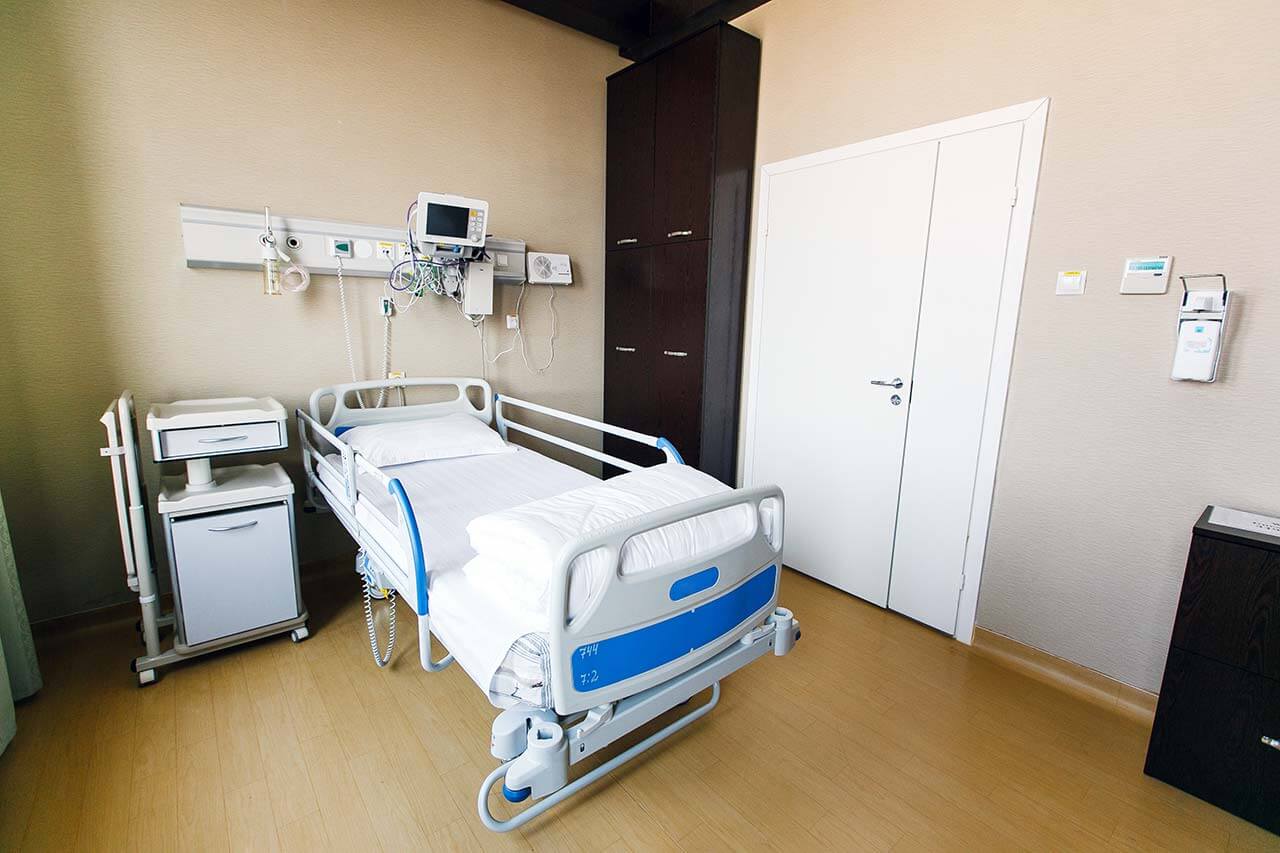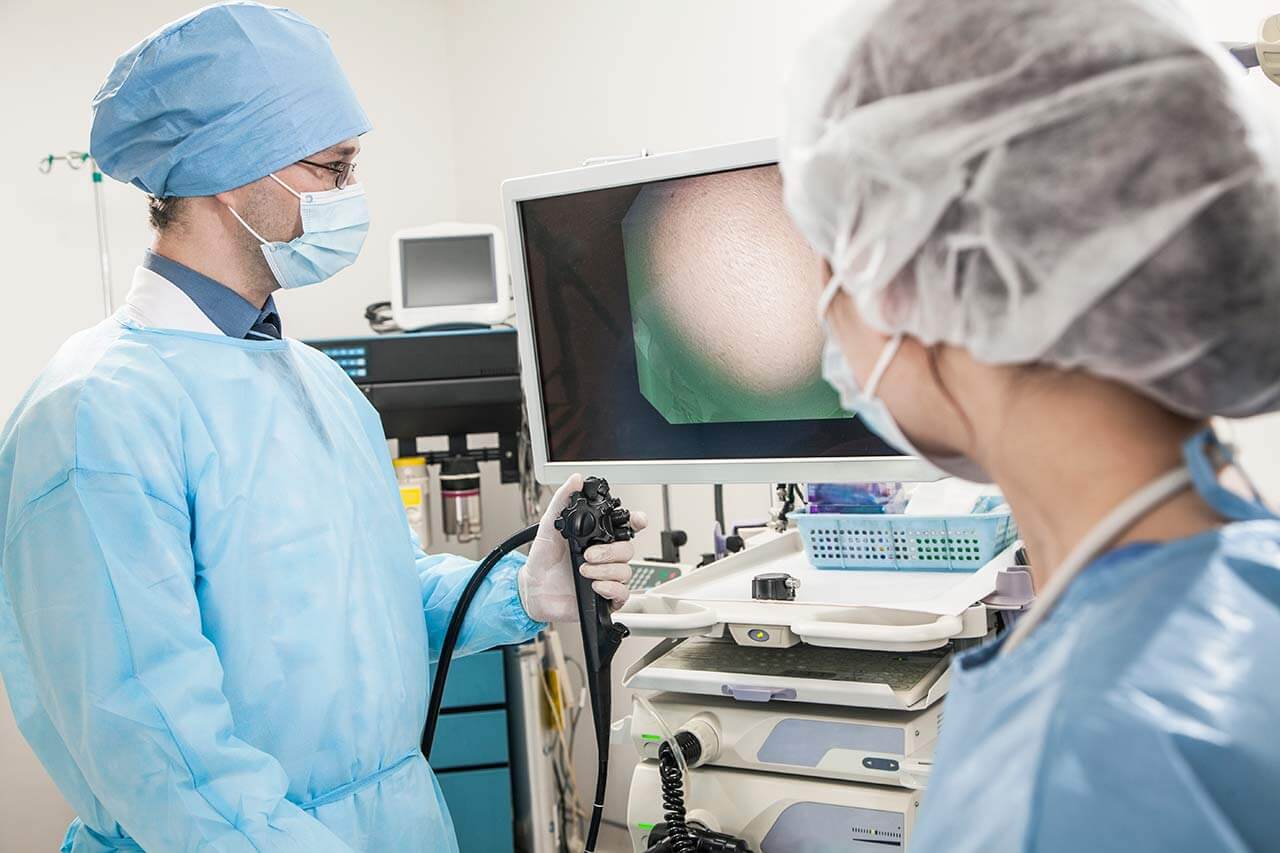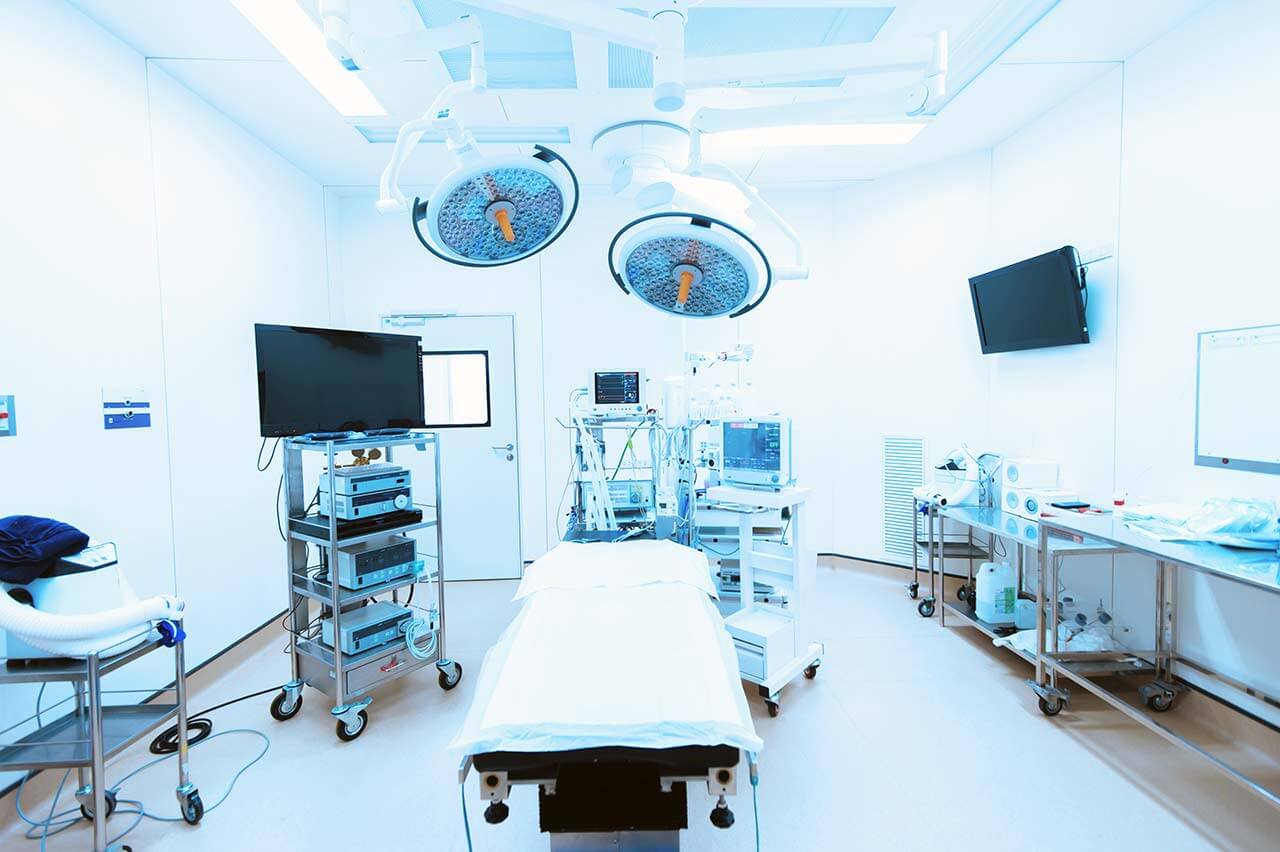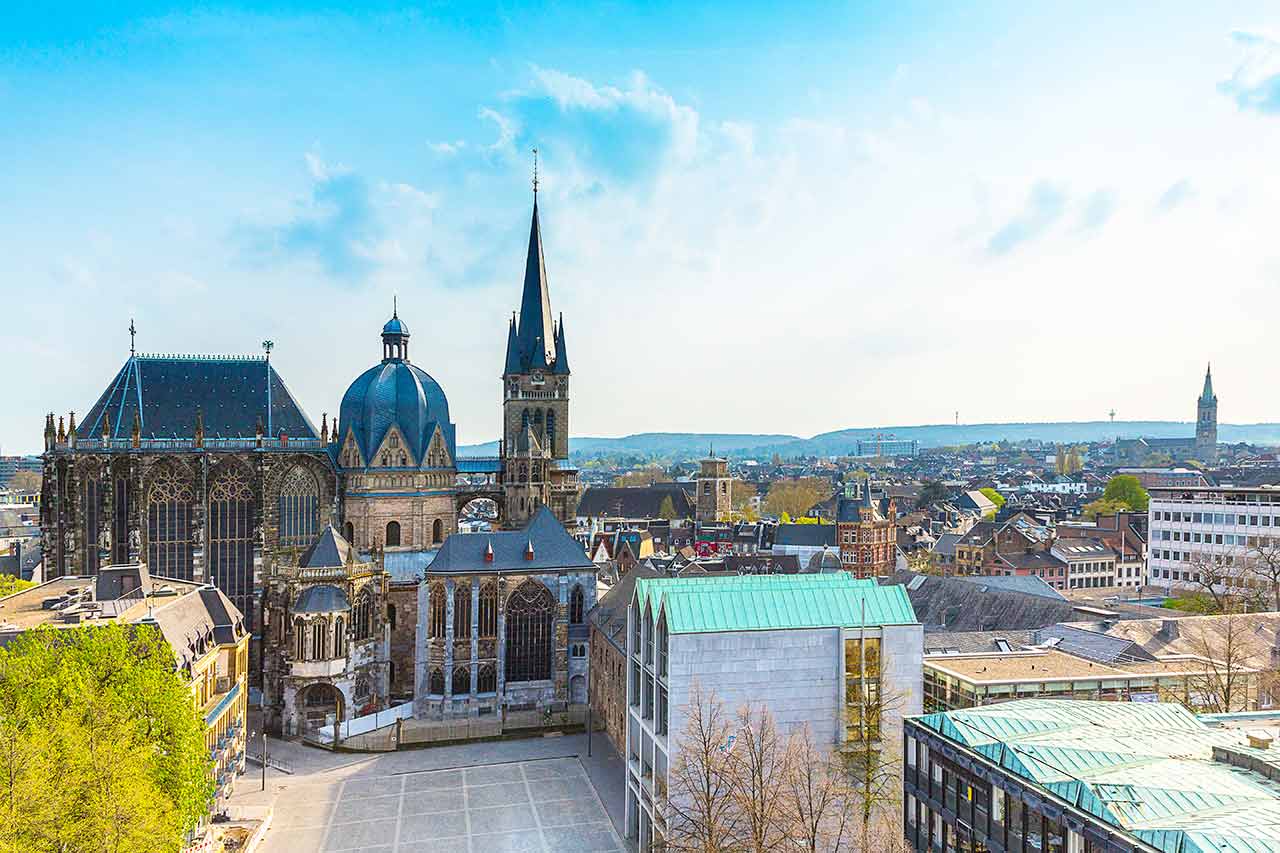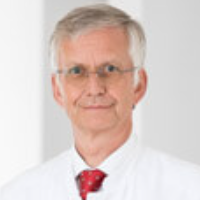
The program includes:
- Initial presentation in the clinic
- clinical history taking
- review of medical records
- physical examination
- laboratory tests:
- complete blood count
- biochemical analysis of blood
- inflammation indicators (CRP, ESR)
- indicators blood coagulation
- TSH-basal
- blood gas analysis
- chest x-ray examination
- measurement of arterial blood pressure
- electrocardiogram (ECG)
- echocardiography (ECHO)
- high-resolution computed tomography (HR-CT)
- ultrasound examination of the chest
- preoperative care
- treatment of the diaphragm ruptur with plastic operation
- symptomatic treatment
- control examinations
- the cost of essential medicines and materials
- nursing services
- full hospital accommodation
- explanation of future recommendations
Required documents
- Medical records
- Chest X-ray/CT scan (if available)
Service
You may also book:
 BookingHealth Price from:
BookingHealth Price from:
About the department
The Department of Thoracic Surgery at the Luisenhospital Aachen offers top-class surgical treatment for benign and malignant diseases of the lungs, bronchi, pleura, mediastinum, and diaphragm. During the treatment, the doctors cooperate closely with pulmonologists, physiotherapists, and specialists in the field of respiratory gymnastics. Such an approach guarantees the patient a comprehensive diagnosis before the operation using imaging tests, endoscopic examinations, and pulmonary function tests, as well as postoperative rehabilitation, in which pulmonologists and physiotherapists are actively involved. In complex clinical cases, medical boards are held with the participation of thoracic surgeons and pulmonologists, who cooperatively elaborate an optimal treatment regimen. The team of the department's thoracic surgeons brilliantly performs minimally traumatic and classic open operations on the chest organs, excluding the heart. A special offer in the department is robot-assisted surgery using the innovative da Vinci system. The specialists of the medical facility always strive to perform minimally traumatic surgical treatment. The department has vast experience in interventions for pneumothorax, pleurisy, pulmonary emphysema, lung cancer, lung metastases, pleural mesothelioma, and other diseases. The department has at its disposal state-of-the-art technical resources and highly qualified experts, whose main value is the patient's health. The Head Physician of the department is PD Dr. med. Ingo-Michael Krueger.
The department's surgeons treat many patients with benign lung diseases. Surgical interventions for pneumothorax, pleurisy, pulmonary emphysema, and pleural empyema are regularly performed here. Pneumothorax is a pathological accumulation of air in the pleural cavity, leading to chest pain, breathing difficulties, shortness of breath, dry cough, and palpitations. When detected in the early stages, the department's specialists carry out a puncture followed by drainage. They thus remove the accumulation of air from the pleural cavity. If this treatment option is not suitable for the patient for clinical indications, surgery is performed, namely thoracoscopic resection of the upper lobe of the lung in combination with partial pleurectomy (removal of the pleura). Pleurisy is an accumulation of exudate, pus, or blood in the pleural cavity due to inflammation or other systemic diseases. To treat pleurisy, the department's thoracic surgeons most often perform a minimally traumatic intervention to implant a permanent pleural catheter. Thoracoscopic pleurodesis is another effective treatment option.
As for malignant diseases, the team of thoracic surgeons specializes in the treatment of lung cancer, lung metastases, and pleural mesothelioma. Lung cancer is one of the most common types of cancer worldwide. The most effective treatment method is surgical resection of the malignant tumor or the affected lung lobe. The department's specialists successfully operate on patients with lung cancer using thoracoscopic and open anatomical resections and angioplastic, bronchoplastic, and extended pericardial resections. Lung metastases can be removed using thoracoscopic and laser techniques. Laser resection is performed even in the presence of multiple lung metastases. During the treatment of pleural mesothelioma, the department's specialists resort to pleurectomy or extended pleuropneumonectomy. Whenever possible, lung and pleural cancer surgery is performed using minimally invasive techniques without a thoracotomy.
The department's operating room is equipped with an innovative da Vinci surgical system designed for performing high-precision minimally invasive interventions. Robot-assisted surgery is available only in a few European hospitals due to the relatively high cost of the device and the need for surgeons to undergo extensive training to master the technique. The Head Physician of the department, Dr. med. Ingo-Michael Krueger, is the co-founder of the Working Group on Robotic Surgery of the German Society for Thoracic Surgery. He has impressive experience in robot-assisted surgical interventions and trains other doctors how to operate the device. The da Vinci surgical system consists of three units: the video stand, the console for patients, and the console for surgeons. It is important to realize that the robot does not perform any surgical manipulations on its own but only follows the commands given to it by the surgeon using the control console. The robot is equipped with four "arms'' with miniature surgical instruments and a camera fixed in them. The "arms" of the da Vinci robot fully imitate the movements of the human hand but have no tremors or involuntary movements. The built-in camera in one of the "hands" of the robot provides real-time 3D imaging of the surgical field, so that the surgeon controlling the robot can clearly see the slightest anatomical structures. Robot-assisted interventions are performed through a minimally invasive approach (1-2 cm incisions). Thus, after robot-assisted interventions, the patient experiences virtually no pain in the postoperative period and quickly recovers. In addition, such operations leave barely noticeable scars.
The department's key focuses include:
- Surgical treatment of pneumothorax
- Drainage
- Thoracoscopic resection of the upper lobe of the lung in combination with partial pleurectomy
- Surgical treatment of pleurisy
- Permanent pleural catheter placement
- Thoracoscopic pleurodesis
- Surgical treatment of emphysema
- Lung volume reduction followed by plastic reconstruction
- Surgical treatment of pleural empyema
- Drainage with local fibrinolysis
- Thoracoscopic surgery
- Thoracoscopic and classical open decortication
- Surgical treatment of lung cancer
- Thoracoscopic or open anatomic resections
- Angioplastic, bronchoplastic, and extended pericardial resections
- Surgical treatment of lung metastases
- Thoracoscopic resection
- Laser resection
- Surgical treatment of pleural mesothelioma
- Palliative pleurodesis
- Abdominal and parietal pleurectomy
- Extended intrapericardial pleuropneumonectomy
- Surgical treatment of other diseases of the respiratory system
Curriculum vitae
Professional Career
- 1985 - 1988 Assistant Physician, Department of Surgery, University Hospital Cologne.
- 1988 - 1990 Assistant Physician, Department of Cardiothoracic Surgery, University Hospital Cologne.
- 1991 Assistant Physician, Department of Surgery, University Hospital Cologne.
- 1994 Habilitation.
- 1996 Venia Legendi in Thoracic Surgery.
- 1995 - 1999 Senior Physician, Department of Surgery, University Hospital Cologne.
- 1999 - 2014 Head Physician, Department of General Surgery, Vascular Surgery and Thoracic Surgery, district hospitals in the cities of Marienhoehe and Wuerselen.
- 2014 - 2019 Head Physician, Department of Vascular Surgery and Thoracic Surgery, Rhein-Maas Hospital Wuerselen.
- Since 01.07.2019 Head Physician, Department of Thoracic Surgery, Luisenhospital Aachen.
Photo of the doctor: (c) Luisenhospital Aachen
About hospital
The Luisenhospital Aachen is a modern health facility that offers top-class European-standard service. The medical complex is an academic hospital of RWTH Aachen University, which provides patients with access to innovations in diagnosis and treatment. The hospital first opened its doors to patients in 1967 and has been carrying out a successful clinical practice for more than 155 years.
The hospital has 15 specialized departments, each of which employs a team of experienced and competent specialists who prioritize patients' health. The main areas of clinical activity at the hospital are general surgery, abdominal surgery, thoracic surgery, vascular surgery, plastic surgery, gastroenterology, cardiology, endocrinology, gynecology, obstetrics, mammology, traumatology, and orthopedics.
More than 17,000 inpatients and about 37,600 outpatients are treated in the hospital every year. The team of physicians consists of more than 160 specialists, while the nursing staff consists of about 500 employees. It is noteworthy that the hospital's doctors regularly admit patients from abroad, so the hospital has gained unique experience in working with international patients.
The hospital provides patients with all the necessary conditions for maximum comfort. The medical staff strives to surround the patient with care and take into account their individual needs. The basis of the work of the hospital's team lies in its own slogan: "Thorough care for a patient and their needs". The good reputation of the hospital in the European medical arena and the constant growth in the number of people wishing to be treated here are the best evidence of the excellent medical care provided here.
Photo: (с) depositphotos
Accommodation in hospital
Patients rooms
The patients of the Luisenhospital Aachen live in comfortable single and double rooms. The standard patient room furnishings include an automatically adjustable bed, a bedside table with a pull-out tray, a wardrobe, a table, chairs, a TV, and a telephone. Each patient room has an ensuite bathroom with a shower and a toilet.
Patients are also offered accommodation in enhanced-comfort rooms. Such patient rooms have a more sophisticated design and are additionally equipped with a safe, a mini-fridge, and a cozy space with upholstered furniture.
Meals and Menus
Patients in the hospital are offered three tasty and balanced meals a day. Patients have a choice of three set menus, including dietary ones. If, for some reason, you do not eat all the foods, you will be offered an individual menu. Please inform the medical staff about your dietary preferences prior to treatment.
There is a cozy cafe, Caféhaus Luise, on the ground floor of the hospital, where patients can enjoy delicious main courses, snacks, pastries, cakes, and pies. The cafe also offers a wide range of hot and cold drinks. In the warm season, patients can have lunch, snacks, or enjoy a cup of coffee or tea with dessert on the beautiful terrace.
Further details
Standard rooms include:
Religion
The hospital has a special hall where Catholic and Evangelical worship is held every Sunday morning. It is also a place of solitude for prayer on any day and at any time of day.
The services of representatives of other religions are available upon request.
Accompanying person
Your accompanying person may stay with you in your patient room or at the hotel of your choice during the inpatient program.
Hotel
You may stay at the hotel of your choice during the outpatient program. Our managers will support you for selecting the best option.
